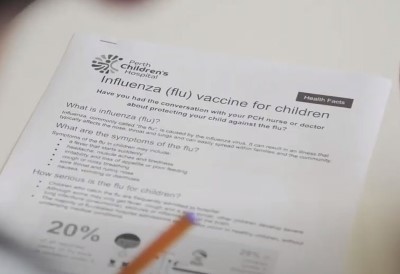Search
Research
Prevalence and determinants of influenza vaccine coverage at tertiary pediatric hospitalsThis study aimed to examine the uptake of influenza vaccination amongst a cohort of Australian children and factors associated with vaccine acceptance.
Research
Persistent and compartmentalised disruption of dendritic cell subpopulations in the lung following influenza A virus infectionImmunological homeostasis in the respiratory tract is thought to require balanced interactions between networks of dendritic cell (DC) subsets in lung...
Research
The safety of seasonal influenza vaccines in Australian children in 2013Our objective was to examine influenza vaccine safety in Australian children aged under 10 years in 2013.
Research
The impact of pandemic A(H1N1)pdm09 influenza and vaccine-associated adverse events on parental attitudes and influenza vaccine uptake in young childrenThis paper reports on the shift in parental attitude to vaccination after 2010, due to an unprecedented increase in febrile reactions in children receiving...
Research
Effectiveness of trivalent flu vaccine in healthy young childrenThis paper reports some of the findings from the Western Australian Influenza Vaccine Effectiveness Study, commenced in 2008, to evaluate a program providing...

News & Events
Help us build a new weapon in the fight against deadly fluAt just two years old, Lucy lost her fight against flu. With your generous help, we can finally beat influenza.

News & Events
RSV and influenza detections hit record low levels in 2020Western Australia has experienced historically low levels of respiratory syncytial virus (RSV) and influenza this winter due to the public health measures implemented to prevent the spread of COVID-19.

News & Events
Flu study gives vital early protection to bubs this winterThe FluBub Study will investigate whether giving the flu vaccine much earlier than the six months currently recommended by the National Immunisation Program will protect babies at the greatest risk of a severe influenza infection when they are most vulnerable.

News & Events
Australian parents oblivious to true danger of the fluNew research investigating the devastating impact of the 2017 flu season by PAEDS-FluCAN, a national collaboration observing influenza in children, confirmed it was time to take action after thousands of children were hospitalised with the virus last year.
Research
Influenza and pertussis vaccine coverage in pregnancy in Australia, 2016-2021Vaccination in pregnancy is the best strategy to reduce complications from influenza or pertussis infection in infants who are too young to be protected directly from vaccination. Pregnant women are also at risk of influenza complications preventable through antenatal vaccination. Both vaccines are funded under the National Immunisation Program for pregnant women in Australia, but coverage is not routinely reported nationally.
